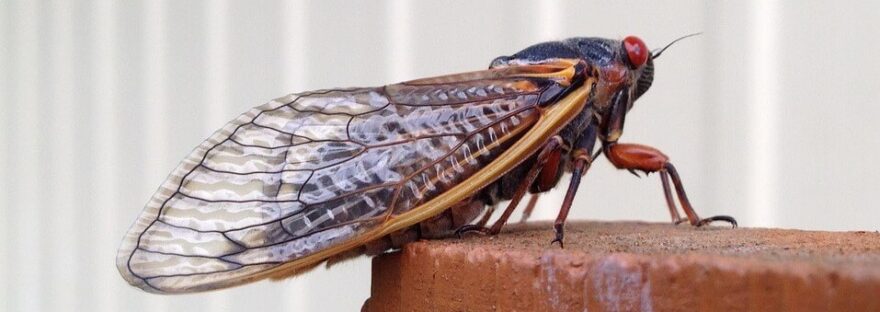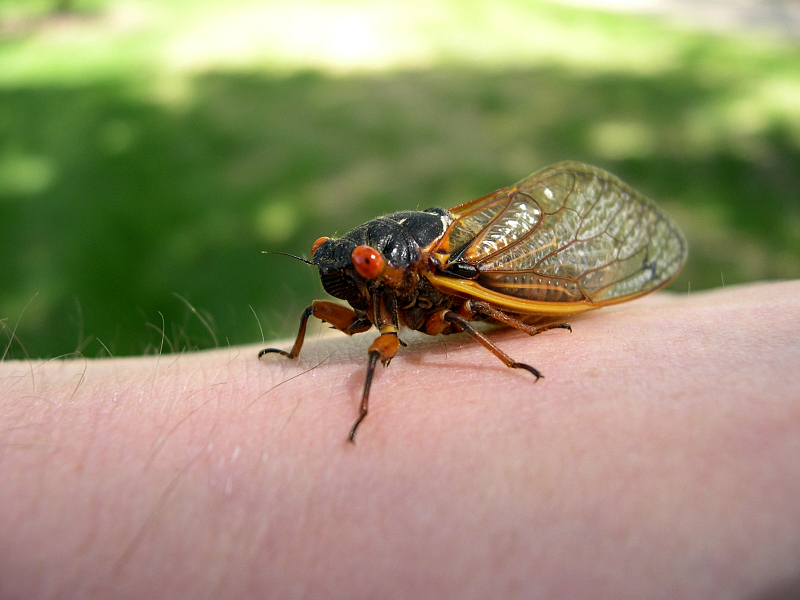
When Are the Cicadas Coming To Lancaster And York?
April 14, 2021Some groups of periodical cicadas come out every 17 years; some groups come out every 13 years, and some are annual arrivers. In Lancaster and York, and across the state of Pennsylvania, cicada nymphs are expected to emerge en masse from the ground in late May or early June. This is the year for the 17-year brood to emerge.

The time of the cicada emergence (and impending swarm) will depend on how warm the temperatures get. Cicadas prefer to emerge when soil temperatures reach 64 degrees, according to Penn State Extension.
There are 8 different periodical cicada broods in Pennsylvania. Brood X (10) is expected to arrive in our area this May-June. We’ll see the adults from the eggs laid in the ground in 2004.
We expect billions of cicadas to emerge from the ground. So why does this happen and what are these insects? Will it seem like a plague of insects? Are cicadas dangerous?
Let’s find out:
Where do cicadas live?
Cicada nymphs live in the ground and feed off sap from the roots of trees. Depending on the species, the nymphs rise to the surface when temperatures rise. They shed their exoskeletons, which they leave behind. You can often find them still in the place where they were shed.
Annual cicadas are found worldwide. Periodical cicadas are found in North America, mostly in central and eastern regions of the United States. The 17-year cicadas do find the Lancaster and York area to be a pleasing home.
Why does it seem like cicadas come out every year?
There are annual cicadas. They are different from the periodical cicadas in that annual cicadas are larger with green wings. Periodical cicadas are darker in color, blacker and browner. Annual cicadas appear above ground July through September but typically do not arrive in swarms. Both species have bulging red eyes and “veiny” wings. All cicadas are clumsy flyers when they first molt and their wings are not hardened.
What do cicadas eat?
The nymphs eat sap from tree roots. The molting cicadas eat twigs. Adult cicadas will eat ornamental grasses. It’s not likely they will cause extensive damage to trees, gardens, or farms.
How long do cicadas live?
Cicadas live, on average, 2 to 6 weeks. They emerge, make noise (some might call it singing), mate, lay eggs, and die.
When will they go away?
The periodical cicadas will go away 2-6 weeks after their emergence.
Do cicadas bite?
Cicadas do not bite nor sting. If they seem to “attack” you, it’s likely because they are clumsy flyers and unable to accurately avoid you.
How do they make noise and why?
The cicada’s mating noise is what you hear. The male cicada’s tymbal (its rib structure), flexes and clicks. Those rabid-fire clicks make the loud humming or buzzing sound.
Why are they so loud?
Collectively, the males’ mating calls can reach up to 100 decibels. They’re so loud because there could be thousands of them in one area and their main goal in life is to reproduce. It’s an urgent plea since the insect’s lifespan is short. Cicadas are louder than a lawn mower, or a stereo on full volume.
How big do 17-year cicadas get?
These periodical cicadas are not as large as the annual type. Annual cicadas can grow to be 2.5 inches long, while 17-cicadas grow to be about 1.5 inches long.
What’s the connection between snakes and cicadas?
Snakes will eat cicadas, especially the females that have eggs ready to lay. They typically will feast on the cicadas at night, but residents in Maryland and New Jersey reportedly have seen snakes during the day at the base of trees. Fish, turtles, skunks, and possums will also eat the cicadas.
What do cicadas do for the environment?
Scientists say they help prune trees and aerate the ground. Once dead, their bodies become a nitrogen source for the soil. More importantly, cicadas are a plentiful source of food for birds, wild turkeys, wasps, squirrels, and other small carnivores.
How do you get rid of cicadas?
Dominion has a program that will knock down the cicadas while helping to control mosquitoes, fleas, and ticks. In the big picture, however, cicadas are not harmful. On the contrary, mosquitoes, fleas, ticks, and spotted lanternfly are harmful and efforts should be made to control these pests. Dominion provides control of mosquitoes, spotted lanternflies, and other harmful lawn pests and we answer dozens of calls from Lancaster and York area residents.
Mosquitoes can spread disease and can ruin summertime gatherings quickly and consistently. Spotted lanternflies are Public Enemy No. 1, threatening orchards, trees, and agriculture. Dominion Pest Control is committed to helping save Pennsylvania agriculture from the invasive spotted lanternfly. We strive to be a local authority and helpful resource to those seeking information and solutions to SLF control.
We can answer your questions regarding lawn pests in your area.